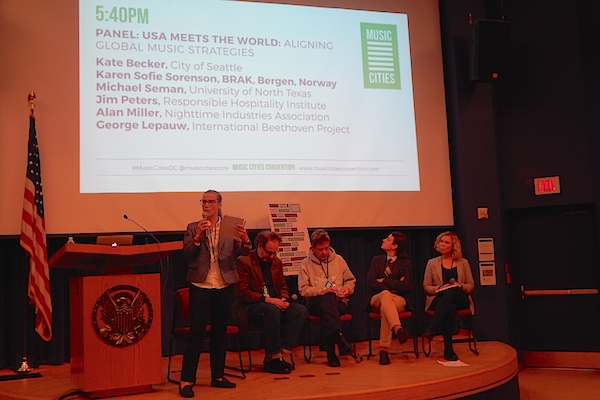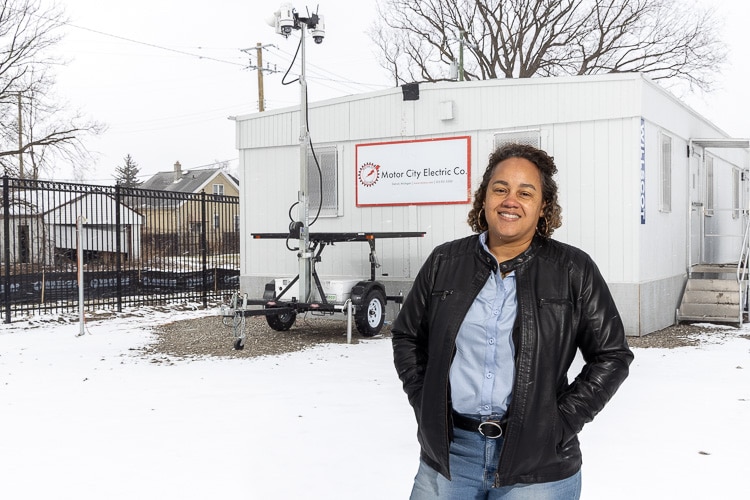The “no curfew economy” and other ideas for Detroit from the Music Cities Convention
A conference held last week in Washington, D.C., discussed the pros and cons of music-based economic development strategies. Here's what Detroit can learn.

So, what exactly makes a city a “music city?”
That simple but loaded question led off a long day of presentations and panels at the Music Cities Convention, held in late October at Georgetown University in Washington, D.C. It was the first U.S. event organized by London-based Sound Diplomacy, which held its first ever conference earlier this year in Brighton, England. I was in Washington accompanying a small delegation from Berlin that included Dimitri Hegemann, the German social entrepreneur who is working on projects in Detroit with the Detroit-Berlin Connection (DBC), the transatlantic group he launched two years ago.
Speakers came from Europe and the U.S., with representation from cities you would expect — people from Austin, Nashville, Seattle, New Orleans, Boston, Brooklyn, London, and Berlin were there not only to talk about economic strategies to bring consumers to a place with music, but the best presentations also discussed the potential perils of success, how to manage it effectively, and how creativity is impacted by money.
One of the panelists, Martín Perna, the founder of Antibalas, a Brooklyn-based afro/jazz orchestra active since 1998, talked about how a studio in Williamsburg where Massive Attack, David Bowie, and TV on the Radio recorded in the 1990s has been replaced by a J. Crew store.
“Nothing against J. Crew, but when I first moved there, I was chased down the street by feral dogs,” Perna said. “Now it’s become too expensive for artists to live.”
Another presenter, New Orleans-born writer Lolis Eric Elie, who co-produced and wrote the PBS documentary “Faubourg Treme: The Untold Story of Black New Orleans” and also served as story editor for the HBO series “Treme,” said that suburban-style residential redevelopment of the city fundamentally threatens its musical heritage.
Since Hurricane Katrina (late August, 2005), because of the way neighborhoods have been rebuilt, Elie said people have a harder time responding to the Second Line when it comes down their street. “The new houses are not right on the street anymore,” he said. “Folks are now way back in the yard and not as likely to join in.”
Many of the speakers were policymakers, representatives of local or federal government, or advocates for progressive social change via creative industries.
Kate Becker, director of the Seattle Office of Film and Music, co-founded nonprofit art and music-based all ages venues that have helped build Seattle’s creative economy talent pipeline. Alan Miller of London-based Night Time Industries Association helps entrepreneurs create and innovate across the UK, contributing 66 billion pounds per year in revenue, boosting employment and regenerating night life in cities. On a panel called “USA meets the world: aligning global music strategies,” Becker and Miller talked about the importance of the night economy for cities that seek vibrant cultural activity. There is now talk in London of creating a “night mayor” to manage music and other social activities after dark.
In a separate presentation, Lutz Leichsenring, the press officer and board member of Clubcommission Berlin who has presented at DBC conferences in Detroit, also talked about the importance of creating a 24-hour, “no curfew” economy. “This is what makes Berlin what it is. People are free to create, to meet, to discuss unconventional ideas. It is scene-driven; we encourage people to speak out, oppose and protest. But we mediate and come to solutions that make sense.”
Detroit, as authentic a “music city” as there is, was not part of the conference. The closest it came to being part of the content was when D.C.-based Grammy-nominated singer/songwriter, producer and, educator Kokayi tipped Dana Burton, a Detroit hip hop artist who has spent the past 15 years in China cultivating a series of freestyle battles called Iron Mic.
Michael Orlove of the National Endowment of the Arts (NEA) also quoted Stevie Wonder by saying “music is a language we can all understand” in his introductory remarks.
Detroit would do well to host a convention of this sort. The city has all the correct historical foundational stuff (rock, blues, soul, jazz, funk, techno) to give it the appropriate gravity. It could also learn a ton from policy nerds, artists and academics from around the world who are coming together in unique partnerships, developing tactics and strategies that we never had. Don’t say we can’t use their help. The conversations would be juiced, the parties jacked. It’s time to transition and transform so the beats will go on.
Walter Wasacz is former managing editor for Model D and a consultant for the Detroit-Berlin Connection.




